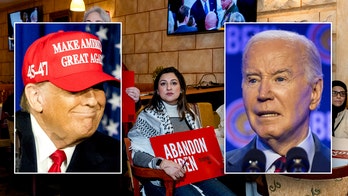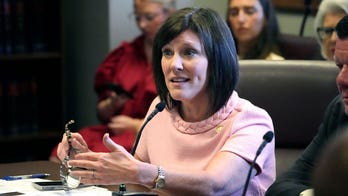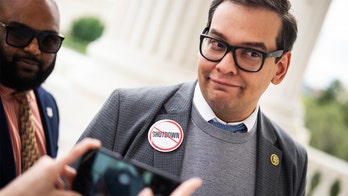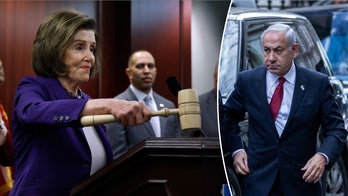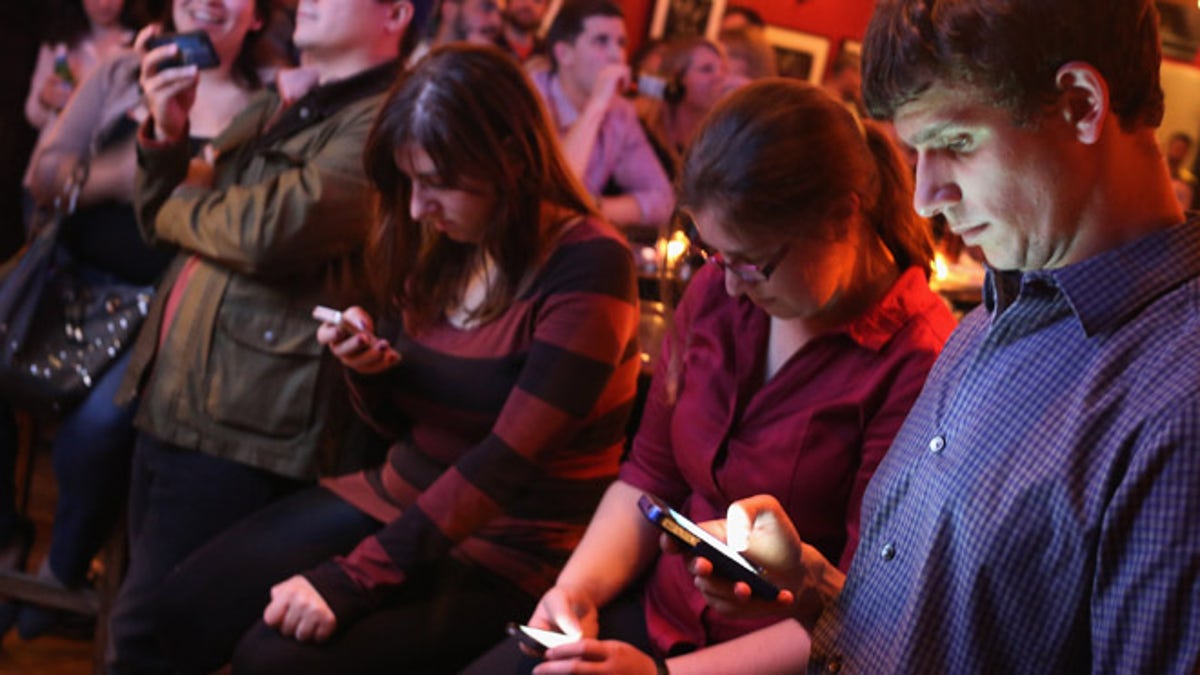
Young adults split their time between the televised debate and their smart phones during a debate watch party at the Local 16 bar and restaurant October 13, 2015 in Washington, DC. (Photo by Chip Somodevilla/Getty Images) (2015 Getty Images)
Ted Cruz has been called many things since he first entered the political spectrum: a Congressional agitator, a Tea party darling, a conservative evangelist and – at least according to outgoing House Speaker John Boehner – a "jackass."
But a tech visionary?
In the crowded Republican presidential field, Cruz – who is currently floundering in the middle pack – is distinguishing himself as the first candidate in either party to release an official mobile app in an attempt to gain more supporters and, maybe more importantly, more campaign donations.
The "Cruz Crew" app – which has been downloaded more than 15,000 times in the three months since it was launched, according to his campaign – may be the first mobile app released this presidential campaign season. But observers say it probably won’t be the last as more and more candidates realize the power and reach that they have on an increasingly mobile-savvy electorate.
"The Republican candidates in particular are trying to be creative with their use of social media and other technologies to reach out to voters," D. Sunshine Hillygus, a professor of political science at Duke University told Fox News Latino. "The motivation is to reach young voters who spend a lot of their time on smartphones."
Cruz is not the first politician to take advantage of the booming mobile app market – both President Barack Obama and his Republican challenger Mitt Romney had apps during the 2012 campaign – but the Texas senator has taken a different course with his "Cruz Crew" app. While Obama’s app was a grassroots organizing tool that let users find registered Democrats, events and campaign stops as well as places to donate or volunteer, Cruz’s app function more like a fundraising video game than a traditional campaign tool.
The app has a number of actions similar to Obama’s 2012 campaign app – the ability to invite friends, share campaign messages to social media, volunteer, RSVP to events and donate. But Cruz’s app also lets users get so-called "Action Points" for engagement that allows users to unlock special activist badges once they reach certain levels (with Revolutionary War-themed names like Patriot, Founder and Revolutionary) and also win prizes.
The app may seem like fun-and-games, but to Cruz’s staff it is all business as the candidate attempts to distinguish himself in a crowded GOP field and continue his strong fundraising push. The firebrand lawmaker’s campaign has not released any information regarding how much money the app has raised, but Cruz's campaign raised $12.2 million last quarter and he’s raised about $26.5 million so far this campaign season.
Cruz’s app also works alongside CruzCrowd – what his camp is calling "the world's first presidential social crowd-funding platform." The website functions in much the same way as the app and has the same fundraising goal in mind.
"Capitalizing on this fun and competitive environment not only raises money, but helps build the grassroots infrastructure that is critical to Sen. Cruz's success," Chris Wilson, director of research and analytics and head of digital strategy for the Cruz campaign, said in a press release.
Political observers say that besides fundraising, mobile apps are a much broader reaching and cost effective way to reach potential voters than the classic television advertising.
"It is so difficult to reach voters through traditional means," Hillygus said. "It’s not just about the money now; it’s about a broader approach to getting ones message out the largest possible audience."
Hillygus added that Cruz’s Republican challenger, Kentucky Sen. Rand Paul, has been taking another tech-savvy route in reaching out to younger voter by using SnapChat.
Paul has been using the video-sharing platform since the summer to tout the "Libertarian-ish" candidate’s ideas on the tax code – along with clips of him using a woodchipper and a chainsaw to tear up piles of papers. The senator was followed soon after by two of his fellow Republican challengers, Ohio Gov. John Kasich and Wisconsin Gov. Scott Walker, who has since dropped out of the presidential race.
"Many younger ‘off-the-grid’ voters aren’t consuming traditional news outlets and are increasingly using platforms like Snapchat as their source of information," said Vincent Harris, Paul’s digital strategist, told Time Magazine back in June.
Even if these mobile app and social media campaigns don’t work – and with only half of eligible voters between 18 and 29 expected to head to the polls in 2012, according to experts, that is a big question – observers say that the exposure campaigns get for these approaches is still worth the effort.
"These campaigns really hope to capitalize on the media attention," Hillygus said.

